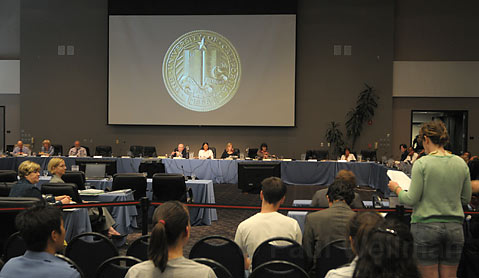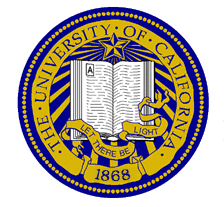Regents Discuss Proposal to Lower UC Entrance Requirements
Also, Statewide System to Get First New Public Medical University in 40 Years

Members of the University of California Board of Regents discussed a proposal to make some drastic changes in the current requirements for freshmen entrance eligibility Wednesday afternoon, as they began to wrap up their three-day-long meeting at UCSB’s Corwin Pavilion.
And, in a landmark decision Thursday, the Board unanimously approved a measure that will create a new medical school at UC Riverside – a proposal that aims not only to strengthen California’s healthcare system, but also to reinforce the UC’s position as one of the nation’s only university systems with to offer wide-ranging options for medical education at a pubic school.
Lowered Requirements for Incoming UC Freshman?

Among the proposed changes to the current entrance eligibility requirements for incoming freshmen – which, if approved, wouldn’t take effect until the fall admissions season of 2012 – is the elimination of the requirement that applicants take SAT Subject (Standard Aptitude Test, formally SAT II) examinations. In addition, the proposal would reduce the number of freshmen eligible for UC’s policy of guaranteed admission for the top 10 percent of all high school students, while simultaneously implementing measures to make more prospective high school students eligible for admission based on their class rankings – rather than other factors like test scores or essay performance.
According to a fact sheet about the proposal submitted to the Regents by the UC Academic Senate, the primary aim of all the changes to the already-established requirements is 10 “encourage a broader pool of applicants” to the UC. However, the fact sheet noted, this does not mean that the changes would quantitatively increase the actual number of students the UC admits each year.
The Regents’ discussion about the June 11 proposal became quite tense at times Wednesday afternoon, as there were many Board members who held polar opposite positions on the issue. However, they were all in seemingly unanimous agreement on one thing: that the Regents, as individuals and as a Board, need to evaluate this issue very carefully, because some of the proposed changes were quite substantial. Yudof’s initial statements about the weight of the issue – the changes were, some said, considerable enough that they could have a significant impact on aspiring UC students in high school statewide. “I want to carefully assess this proposal,” Yudof said. “It’s one of the most consequential things the regents can approve.”
Though the proposal, which the Board will be voting on at a later date, was met with praise from many of the Regents, including Yudof, the majority of the time spent discussing it went to its critics. Regent Judith Hopkinson said she worried about a provision in the proposal to lower the minimum grade point average because she said it could have a ripple effect on the state’s K-12 schools.
Regent George Marcus expressed skepticism for the proposal as a whole, noting that while its policy modifications would probably broaden the pool of applicants effectively, they might also have the unintended consequence of being perceived by the public in a “grossly generalized” form: a scenario in which UC would eliminate the “kid who always obeyed the rules” from its pool of applicants in favor of a kid who didn’t.
One of the more controversial changes to current UC admissions policies that would be changed by the proposal is the elimination of the requirement involving SAT Subject exams – at least two of which the UC currently requires that an applicant submits his scores from in order to be considered for admission to any campus. The exams, which are taken after a student has completed the initial SAT or ACT, are formal, subject-specific tests – usually in writing, history or math – that are designed to allow students who have highly-developed interests in one particular subject to demonstrate their knowledge of the topic and, also, their writing abilities. The rationale behind eliminating the requirement for the SAT Subject exams is rooted in the fact that new data that shows that while about one-third of California high school students take the SAT I test, a much smaller portion of them go on to take the Subject exams. The university hypothesizes that the one of the reasons a considerable number of otherwise qualified students don’t end up applying to UC every year, then, is that they didn’t know about the Subject exam requirement, “for significant reasons.” Therefore, eliminating this requirement for freshman eligibility would “broaden the pool” of applicants, allowing campuses to have more chances of selecting academically strong students, some of whom may have missed the Subject test.
While the high school class of 2012 might rejoice if they learn they have one less test to take, most of the criticism of the proposal has been specifically aimed at this measure, coming from not only bloggers and educational policy buffs, but also from onlookers at the Regents meeting – and from several Regents themselves.
Lotey Kinney, a UCSB junior who attended portions of the meeting, said that if the Regents had eliminated the SAT II test in high school, he would have been put at a disadvantage “Those tests are where you really get to show what your academic abilities are,” he said. “If they had only had my SAT I test to look at, then I’d have been S.O.L, because I cant do that literature stuff very well – and that’s half of the test: I got an awesome score on my SAT II calculus and U.S. history tests, though,” Kinney continued. “The SAT I doesn’t show anything about your academic abilities or how smart you are. It just measures how well you can take the SAT.”
Another proposed change in the current requirements for freshman eligibility would be a reduction in the number of students the UC admits under its guaranteed admission rule, which currently mandates that the top 10 percent of every high school’s graduates get a spot at one of the ten UC campuses if they apply. (This spot is usually not the one of the student’s preference, however, as most who are admitted to the University just by this rule end up at the campuses that have the most open space – often lately UC Riverside or UC Merced.) The plan proposes to tighten the belt of this rule, and change the rule to apply to only 9 percent of the state’s graduating high school classes.
New Med School for UC Riverside
Whether or not the incoming class of 2012 enters the University as the pioneers who conquered the SAT Subject Area Requirements, another group of students will be entering the UC as pioneers of their own trade along with them the same year. The Regents’ unanimous vote on Thursday to establish the School of Medicine at UC Riverside (UCR) means 50 of the hundreds of expected applicants – who will begin medical school at the campus in 2012 – will be in the school’s first graduating class.
UCR acting Chancellor Robert D. Grey, who gave a formal presentation about the project to the Regents before the vote, said the new School of Medicine will have a significant impact on the lives of many Californians, especially those in the Inland Empire – because the area is predicted to face a 53 percent physician shortfall by 2015, accompanied by a substantial national shortage in healthcare services as well.
In order to avoid an up-front capital cost, Grey said that the School – which, when completed, will be California’s first new public medical university in over 40 years – will not have its own teaching hospital, at least for now. Grey also said that funding for the project could not – and would not – come at the expense of the UC’s five other medical schools, which are located in Davis, Irvine, Los Angeles, San Diego, and San Francisco. The movement to get the project approved had received strong support from Riverside county supervisors and other public officials, many of whom attended Thursday’s meeting in hopes of witnessing its approval.
According to a press release from the UC Office of the President, the limited enrollment size of 50 students for the first incoming class will eventually be expanded. As the School proceeds with the next phases of construction, it will launch more residency programs to provide postgraduate medical students with the required training for medical licensure, and enrollment will gradually grow to a total of 400 medical students, 160 residents and 160 graduate students.
One key element of the school’s mission, according to the press release, will be to developing research and healthcare-delivery programs so as to improve the lives and health of people in “medically underserved populations.” Having received the Regents’ approval, Grey said that next steps to establishing the new School of Medicine, Grey said, are to hire a founding dean, formalize agreements with regional partners, accelerate funding, and finalize the project’s financial strategy.
The Regents will meet again in September, holding their bimonthly conference this time at UC Irvine.



